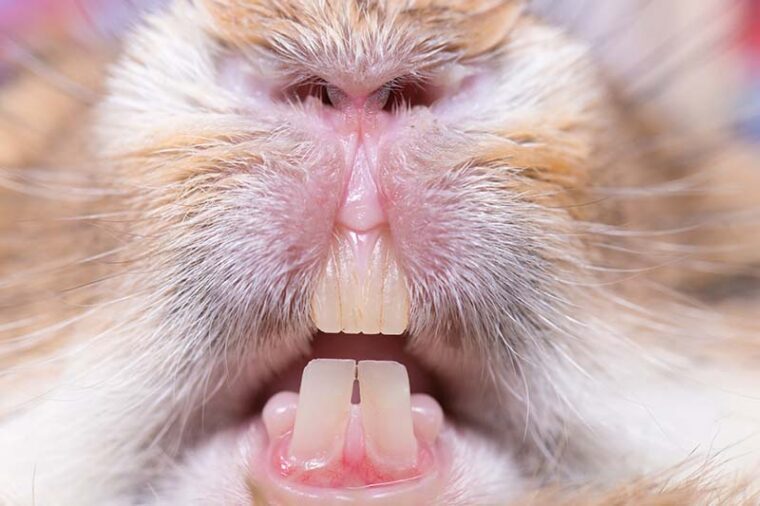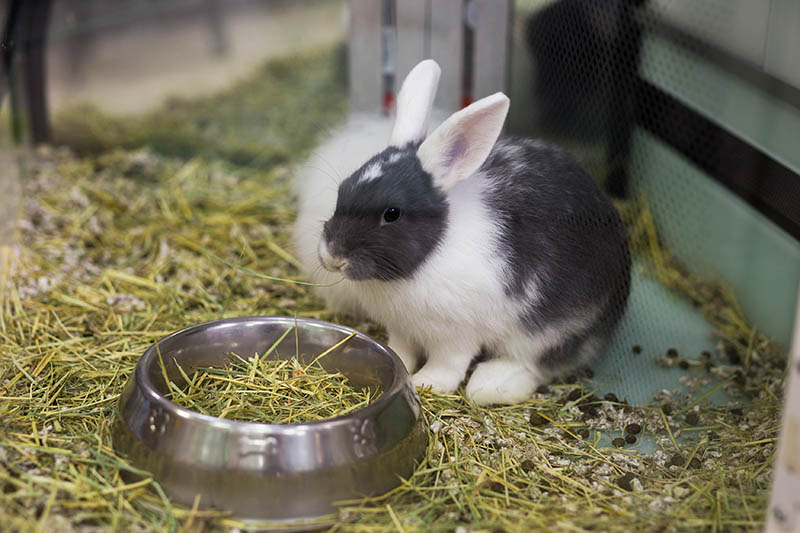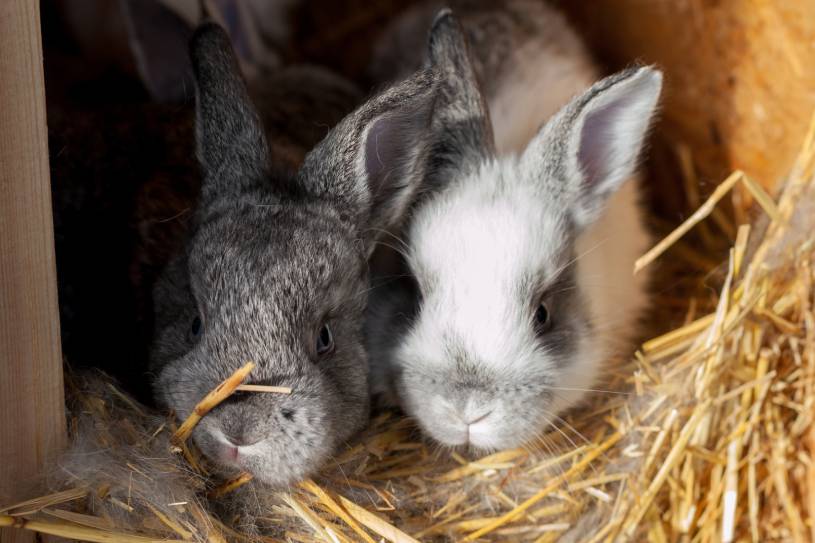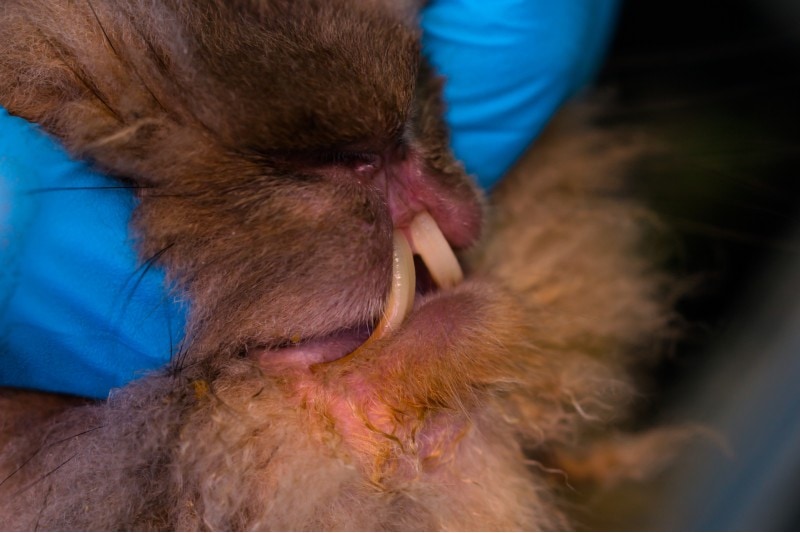
A rabbit’s teeth will constantly grow throughout their life. They have special teeth that are open-rooted, meaning that they never grow to a certain length but continuously produce new tooth material. As a result, a rabbit’s teeth will grow almost 5 inches in a year! That is why it’s essential to keep them short and sharp. Read on to learn seven tips and tricks for keeping your rabbit’s teeth short and healthy.

The 7 Expert Tips to Keep a Rabbit’s Teeth Short
1. Give them Hay
You should already be providing your rabbit with plenty of hay of all types.1 Hay should comprise around 90% of your rabbit’s diet since it contains long fibers and other nutrients that only hay can provide. Timothy hay is important for rabbits to have, as it helps them wear down their back teeth (molars) and keep them short.
Rabbits chew the hay in a side-to-side grinding motion, which is the only way to reliably and efficiently wear down the ever-growing teeth at the back of their mouth. Hay is beneficial to rabbits, and they can have as much as they like, so always ensure they have a fresh daily supply!
With the exception of grass hay, other materials in this article should not be actively consumed by your rabbit.
If you notice your rabbit consuming the other materials listed, please remove them from your rabbit’s enclosure and consult your veterinarian promptly.

2. Wooden Blocks
Wooden blocks and toys made of wood, such as untreated, kiln-dried pine (not fresh), are great toys for rabbits to play with. They offer a satisfying chew that can keep their sharp teeth in shape.
Some woods are less suitable than others, and some are potentially toxic, but most wooden toys marketed for rabbits should be safe for them to chew. While rabbits will avoid swallowing any wood that they chew, make sure to monitor them while they’re nibbling away. Swallowed wood can become lodged in the stomach and cause obstruction.
3. Twigs and Branches
Similar to wooden toys and blocks, rabbits will love indulging their wild chewing instinct by gnawing on twigs and branches. It’s advisable to buy these already dried from a pet store, as it can be easy to misidentify types of wood. However, a few branches should never be given to rabbits as they are toxic.
This also applies to wood blocks and toys. Kiln-dried pine is safe for rabbits to chew; the kiln-drying process removes the phenols in the wood, which are toxic to rabbits.

4. Cardboard
An alternative to wood and branches is cardboard. Cardboard that is non-printed (free of ink) can serve as a chew toy for your rabbit while also offering some enrichment. As with all chew toys, keep an eye on your rabbit when they’re chewing cardboard. Remove the item if you notice your rabbit consuming the cardboard.
5. Check Their Teeth
An essential part of keeping your rabbit’s teeth short is checking them regularly for signs of overgrowth. Most rabbits won’t like you touching their mouths for very long, so only a quick look is needed to ensure the teeth look healthy and are at the correct length.
However, if your rabbit’s teeth start to look yellow or crooked, they require veterinary assistance. Keep in mind that you’ll only be able to see the front teeth (the incisors) when checking the length, so keep up to date with your rabbit’s vet checkups so they can look further in the mouth.

6. Know the Signs of Problems
Knowing the signs of dental problems in rabbits is just as important as checking when keeping their teeth short. The most common reasons rabbits stop eating is dental problems and overgrowth, which is extremely detrimental. If a rabbit stops eating, their gut motility (movement) slows and can stop altogether.
7. Get them Burred
If your rabbit has teeth that are misaligned or have other problems that prevent them from keeping them short, they will have to go to the vet to get them burred. Burring is the process of filing down a rabbit’s teeth, usually with an electric file, while under anesthetic. Rabbit teeth used to be clipped, but burring has replaced the method because of the risk of infection and splitting. Likewise, you shouldn’t try to file your rabbit’s teeth yourself.


Why Does A Rabbit’s Teeth Get Misaligned?
A rabbit’s teeth can get misaligned for different reasons, including hereditary causes. Dwarf breeds are more likely to have genetic malocclusion, which they inherit from their parents. Acquired malocclusion is any tooth misalignment that’s not from genetic causes. This includes rabbits not being able to grind their teeth down on roughage such as hay, pulling on the wire of a cage, or even accidents that change the position of the teeth.
Why Is It Important To Keep My Rabbit’s Teeth Short?
If a rabbit’s teeth are allowed to overgrow or become misaligned, it can cause serious problems for their health and welfare. The main problem is that overgrown teeth get sharp and cause acute pain as they cut into the mouth’s soft tissue.
Teeth that grow too long can prevent a rabbit from eating, leading to a condition known as gut stasis; in gut stasis, the rabbit’s digestive system slows to a stop. Bacteria in the gut then become unbalanced, leading to stomach swelling and further inappetence. This can rapidly become fatal, so keeping your rabbit’s teeth short is crucial!
Because of how a rabbit’s teeth grow, teeth that get too long can also have elongated roots. These can then grow up into the face and the eyes, causing weeping eyes and abscesses. Infections, the loss of teeth, and large amounts of pain can all occur from poor dentition; keeping your rabbit’s teeth short and giving them all the hay they want is a critical part of their care.

How Many Teeth Do Rabbits Have?
Rabbits have 28 teeth: 16 at the top of their mouth and 12 at the bottom. This includes four incisors, two auxiliary incisors, ten premolars, and 12 molars.

Conclusion
Looking after your rabbit’s teeth is very important, and letting them get out of hand can have serious consequences. Rabbits naturally wear their teeth down by grinding them on each other (in the case of incisors) and on fibrous food like timothy hay. If rabbits have a poor diet that lacks hay, their teeth can become overgrown and cause problems. Malocclusion can be dangerous for rabbits and can be hereditary or acquired. Checking your rabbit’s teeth regularly is the key to keeping them short and your rabbit happy!
Featured Image Credit: Roselynne, Shutterstock










